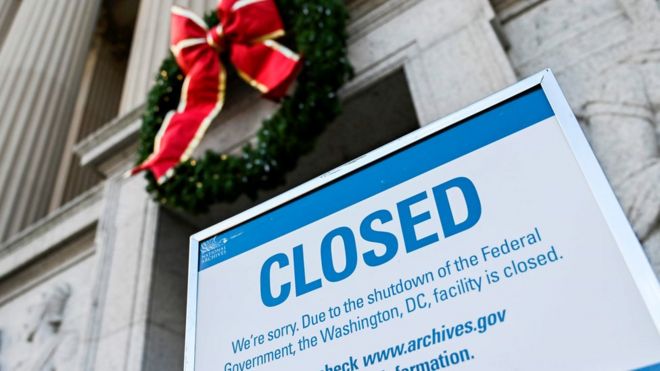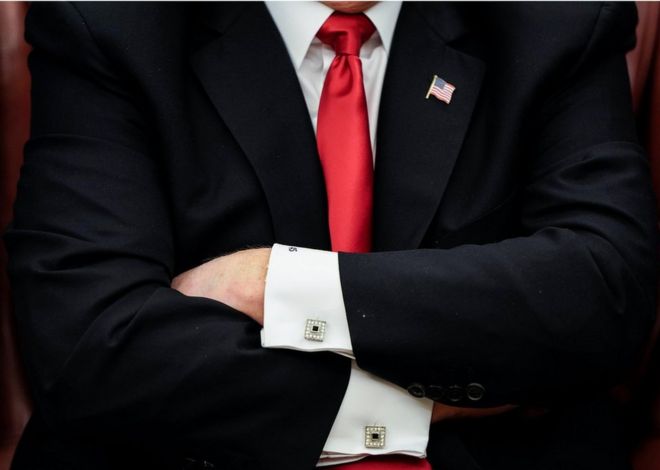
The National Archives building in Washington has been shut down by the dispute
A partial US government shutdown over budget spending could continue right up to the opening of the next Congress on 3 January, a Trump aide has said.
The shutdown began at midnight Friday after opposition Democrats resisted President Donald Trump's demand for $5bn for his Mexico border wall. Mr Trump's acting chief of staff, Mick Mulvaney, suggested Democrats were "beholden" to their left wing. A Democratic senator said his party opposed any funding for the wall.
"That's correct," Sen Jeff Merkley told an ABC news interviewer when asked if his party was not going to approve any money for the Trump administration's project. "None."
Earlier, the party offered a sum of $1.3bn for border security. Mr Trump himself took to Twitter on Sunday to defend his plans for the border with Mexico.
_________________________________________________________________________
"It's very possible that this shutdown will go beyond the 28th and into the new Congress," Mr Trump's acting chief of staff told ABC. "This is what Washington looks like when you have a president who refuses to sort of go along to get along."
In a separate interview for Fox News, he said he was waiting to hear from Senate Democratic leader Chuck Schumer about a new Republican offer, without specifying the sum. Speaking to ABC's This Week program, Sen Merkley said a "30-foot concrete wall" and "30-foot steel spikes" were "not the smart way".
Why can't Trump get his budget passed
His Republican Party controls both chambers of the outgoing Congress and the budget was indeed passed by the House on Thursday by 217 votes to 185. However, he needs to find 60 votes in the 100-seat Senate, where the Republicans currently have 51, so he needs to enlist the support of Democrats there.
How is the shutdown playing out?
Nine of 15 federal departments, including State, Homeland Security, Transportation, Agriculture and Justice began partially shutting down after funding for them lapsed at midnight Saturday. Hundreds of thousands of federal employees will have to work unpaid or are furloughed, a kind of temporary leave.
In practice, this means that:
- Customs and border staff will keep working, although their pay will be delayed. Airports will continue operating.
- About 80% of National Parks employees will be sent home, and parks could close - although some may stay open with limited staff and facilities.
- About 90% of housing department workers will take unpaid leave, which could delay loan processing and approvals.
- Most of the Internal Revenue Service (IRS) will be sent on unpaid leave, including those who assist taxpayers with queries.
- The Food and Drug Administration will pause routine inspections but "continue vital activities".
What happens next?
The current Congress reassembles on Thursday after the Christmas holiday. On 3 January, new members of Congress will be sworn in, having been elected in November's mid-term elections. From that point, Democrats will enjoy a majority in the House of Representatives. Mr Trump has said the shutdown could last a "very long time".

Review of 5 Big Crises in a Head Spinning, Mind Boggling, Chaotic Week
Here's a look at the crises - plural - that have unfolded in the past few days.
Most, if not all, are of the president's own making. Mr Trump campaigned as a disrupter, and this week has been disruption in the extreme.
The shutdown fight
At the end of last week it appeared that Congress was on a glide path toward avoiding a partial shutdown of the federal government.
Then, on Thursday, everything went haywire. After the White House had signalled it would support the stopgap funding measure, hard-core conservative media outlets and politicians demanded the president draw a line in the sand over building his much-promised border wall.
Mr Trump abruptly changed course, announcing that "any measure that funds the government must include border security". The fact he's stopped calling for a wall and instead asked for border security and "metal slats" - fencing - is a concession that might have meant something if it was made weeks ago, and not under the shadow of a shutdown.
The House of Representatives seems solidly behind including wall funding in any bill. But the Senate, with only 51 Republicans and unified Democratic opposition, is well short of the 60 votes needed to agree to such a measure. And if enough House members change their mind, there's always the chance that the president will veto a stopgap bill without any funding for the wall.
The dynamic changes considerably on 3 January, when Nancy Pelosi and the Democrats take over the House.
At that point, the door slams shut on wall funding ever being approved in the House. The Senate may very well acquiesce to a new wall-free spending bill and the president becomes the final roadblock.
Trump fears the disapproval of his base more than he regrets putting hundreds of thousands of gov't employees out of work for an indefinite period.
The great withdrawal
If Mr Trump's pivot on budget funding was surprising, his unexpected announcement that he's pulling the 2,000 US troops out of Syria - and reports of plans for thousands more coming home from Afghanistan - was an electric shock through the US foreign policy establishment.
The fact that the president, who campaigned in part on drawing down US involvement obligations abroad, might contemplate such a move is not unexpected. The manner in which the announcement was made, with little apparent consultation with senior government officials or US allies abroad, is the primary source of upheaval - and the cause for concern among even those who might otherwise support the decision.
Then came the exclamatory punctuation mark at the end of the drawdown drama. Defence Secretary James Mattis, perhaps the most universally respected member of Mr Trump's Cabinet, announced he was resigning because of differences of opinion he has with the president. In his announcement, he offered full-throated support for the US alliance structure and a warning that the US must serve as a counterweight to authoritarian rivals.
Then came his parting shot.
"Because you have the right to have a Secretary of Defence whose views are better aligned with yours on these and other subjects, I believe it is right for me to step down from my position," he wrote.
It was one of the most direct suggestions of disapproval from any of Mr Trump's ever-expanding list of former advisers and Cabinet secretaries.
All of this raises the question, why did the president act now? There has been some speculation that it may be tied the budget fight over the Mexican border wall. If people tell the president there's not enough money, then he'll reduce US commitments abroad. Others have suggested the move was a distraction in the midst of an unpleasant news cycle. Or perhaps it was a move to placate Turkey or - an evergreen explanation - Russia.
In the past, Republican politicians have managed to walk the line between offering tuts of disapproval for presidential actions they don't like, while still voting lockstep for conservative policy priorities. In the coming days, however, this straddling effort will be tested like never before.
Mueller's circling army
In a recent article in The Atlantic, Benjamin Wittes and Mikhaila Fogel compare Robert Mueller's special counsel investigation of possible Russian ties to the Trump presidential campaign to a siege on a walled city. If the investigation is "a campaign of degradation over a substantial period of time", this week brought a number of new volleys that could hasten the eventual collapse.
There was Michael Flynn's sentencing, in which Mr Trump's former national security adviser admitted in open court that he knowingly lied to the FBI and wasn't tricked or trapped into it. The judge, Emmet Sullivan, then suggested he sold his country out.
Facing the prospect of an angry judge threatening jail time, Flynn's lawyers asked for a sentencing delay - dangling the possibility of more co-operation by Flynn and guaranteeing this portion of the Mueller investigation will stretch on until at least March.Meanwhile, the Senate released two investigations into Russian social media campaigns to influence the 2016 presidential election. They indicated the scope of the attack was much wider than previously known. The efforts reached hundreds of millions of people on Facebook, Twitter, Instagram, YouTube and other services, engaging conservatives and discouraging key voting blocs on the left, all in an attempt to help Mr Trump's presidential bid. The president and his supporters have dismissed evidence of Russian meddling as blame-shifting by Democrats seeking an excuse for their 2016 defeat. With these reports, that becomes a more difficult case to make.
What's still not known is if there are any direct links between the Russians and the Trump team. Rumours swirl of new Mueller indictments on the horizon, however, perhaps of Trump confidant Roger Stone, who had contacts with WikiLeaks, the group that released hacked Democratic documents. Then there's the NBC News report that Mr Mueller could release his findings and conclusions in mid-February - which, although it seems like an eternity in US politics these days, is just two months away. The clock is ticking - providing a possible explanation for Mr Trump's attitude of late.
A crumbling foundation
There was evidence as early as 2016, thanks in large part to the efforts of the Washington Post's David Fahrenthold, that Donald Trump frequently used his family's charitable foundation - funded in large part by donations from other people - to settle business lawsuits, buy baubles at auctions and, during the presidential campaign, advance his political interests.
Any of this could qualify as "self-dealing" and put the charity's tax status at risk. The controversies swirling around the foundation attracted the attention of the Democrat-run attorney general's office in New York, which launched an investigation. On Tuesday, they negotiated the dismantling of the charity.
Mr Trump and his lawyers explained that they wanted this all along, and that the entire inquiry was the result of "sleazy Democrats". But this is another dark cloud that won't be disappearing anytime soon. Barbara Underwood, in a statement, called the foundation "little more than a chequebook" for the Trumps, with activity that displayed "a shocking pattern of illegality".
What's more, she said, the state would continue to seek millions of dollars in back taxes and fines from the Trump Organization, and sanctions against the president and his three oldest children.During the 2016 campaign, Mr Trump repeatedly criticized Hillary Clinton and her family's much-larger operating foundation. Two years later, however, it's the president's charity that remains in the headlines.
Dow heading down
Mr Trump has spent much of his presidency touting the seemingly endless ascent of the US stock market.
"The Stock Market just reached an All-Time High during my Administration for the 102nd Time, a presidential record, by far, for less than two years," he tweeted in early October. Politicians who hitch their star to the stock market, however, can be in for a bumpy ride. Since Mr Trump wrote that tweet, the Dow Jones Industrial Average has fallen more than 4,300 points - a 16% decline.
Due to a combination of rising interest rates, the president's trade wars, the impending government shutdown and indications of slower economic growth, the now long-in-the-tooth bull market may be coming to an end. December has seen the biggest market decline since the Great Depression and the largest drop in any month since 2009.
What goes up eventually comes down and the timing may not be good for the president.

No comments:
Post a Comment
Through this ever open gate
None come too early
None too late
Thanks for dropping in ... the PICs